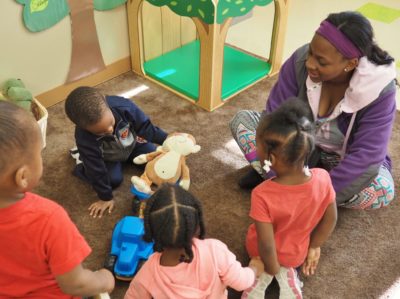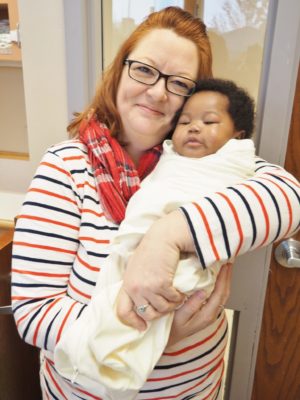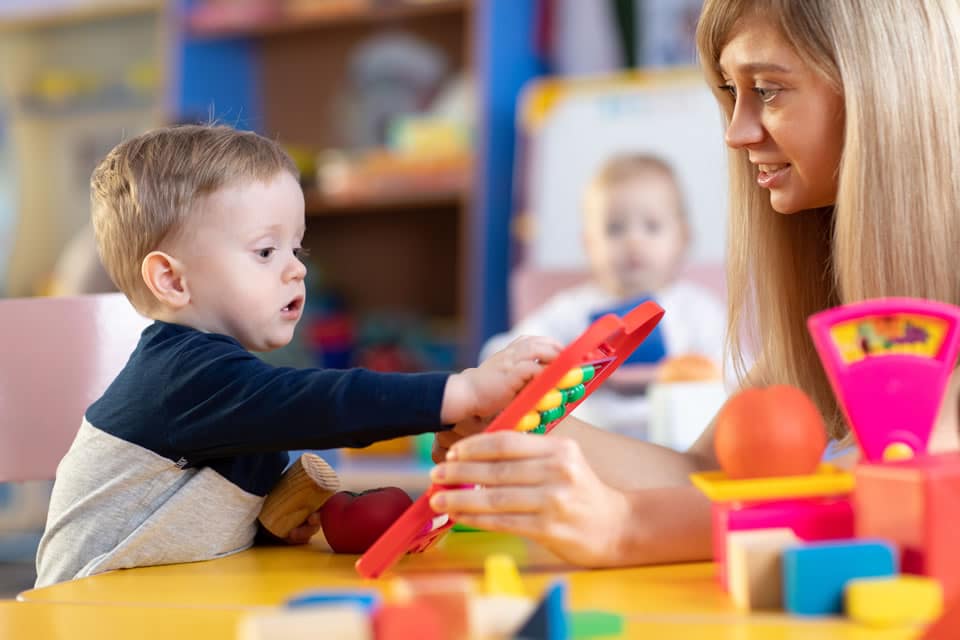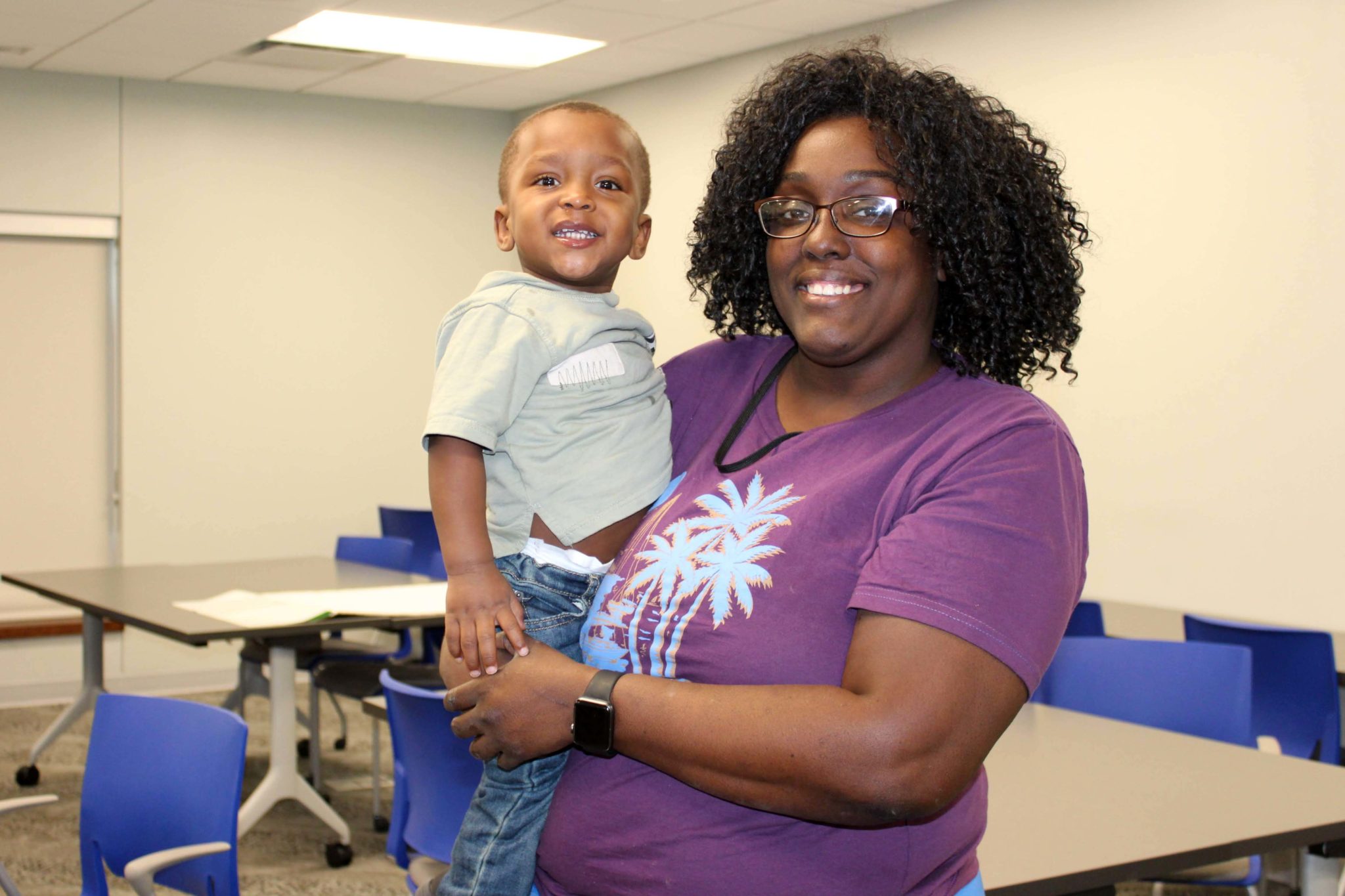
Teacher Dasheena Moore practices the 14 Talking Tips with children in her classroom. “The tips have helped me get my kids talking more by following their lead and paying attention to what they’re interested in,” she said.
Acelero Learning is a provider of early childhood education and family engagement services focused on closing the achievement gap for Head Start children. The company operates two arms: Acelero Learning, which manages Head Start programs in four states, and Shine Early Learning, which provides tools and resources to other Head Start programs.
Their core mission is to use data to improve outcomes for children and families. Because of this emphasis on data, Acelero has produced some of the largest child outcome gains ever recorded at an individual Head Start program.
“What makes us unique is that we operate our own programs across the country. Our scale allows us to benefit from research, practice, and national expertise. We have a very disciplined approach to innovation,” Sarah Barton, Vice President of Early Head Start, explained.
Tracking and reporting data
The organization tracks data to use internally for quality-improvement initiatives and measures metrics on child health, family engagement, and school readiness to report to the Office of Head Start and to gauge their own success.
Monitoring and assessing the quality of teacher child interactions and supporting teachers to improve their classroom practice is a time consuming yet important process. Head Start programs are required to provide coaching to classroom teachers using a variety of observation tools, all with some degree of subjectivity.
“There’s a lot of uncertainty,” Barton said. “Coaches are often only able to observe each classroom for 30 minutes once a month — what’s happening the rest of the time?”
"LENA provides immediate data on what an individual child’s experience is within the classroom and how much talk they’re participating in, which we know is a key indicator of school readiness."
-Sarah Barton
And while the goal of tracking data is to use it to effect positive changes in the classroom, teachers often wait weeks in between coaching sessions before getting feedback on areas of improvement.
Looking for a solution, Acelero launched a pilot program in the spring of 2018 to test using LENA technology in classrooms as a quick, easy, and objective data-collection tool.
Using LENA to improve quality
LENA technology accurately measures the amount of talk in a child’s environment and creates easy-to-understand feedback reports for teachers.
“One of our values is being data-driven,” Barton said. “LENA provides immediate data on what an individual child’s experience is within the classroom and how much talk they’re participating in, which we know is a key indicator of school readiness.”
Research shows that the amount of back and forth interaction with adults a child experiences between the ages of 18-24 months is related to their IQ, verbal comprehension, and language skills 10 years later. Other studies have indicated that language exposure is related to the child’s brain processing speed, subsequent vocabulary acquisition, and success transitioning to kindergarten.
The LENA feedback reports include metrics on the amount of conversational turns that each child experienced, as well as a room summary report that helps each teacher to understand their growth over time. To put that data into action, teachers typically meet weekly with a coach while participating in LENA Grow, a professional development program for ECE teachers.

Teacher LeeAnn O’Connell shared: “I really like seeing the data from my own classroom. It makes it real and tells me where to focus to get better.”
“I really like seeing the data from my own classroom. It makes it real and tells me where to focus to get better,” LeeAnn O’Connell, a teacher in Wisconsin, shared.
The reports also identify which hours of the day include the most interactive talk. Coaches help teachers to think through what they were doing at that time, and use the same strategies during lower-talk hours.
“There were a lot of ‘aha’ moments during the initial pilot,” Barton said. “Teachers really like the 14 Talking Tips. Often we end up using a lot of jargon in the education world, but these tips just get to such a basic level — be silly, wait, take turns — that they’re things that our teachers can really grab onto.”
For Dasheena Moore, another teacher in Wisconsin, the tips proved to be a practical tool to increase conversations in her classroom.
“The Talking Tips are simple to understand and implement in a busy classroom, so it’s easier to actually do them. They’ve helped me get my kids talking more by following their lead and paying attention to what they’re interested in,” she said.
The data reflected what Barton and Moore had observed — individual children were experiencing more conversation by the end of the pilot, and teachers were improving interactivity during their highest conversational turn hours.
A practical tool for a growing organization
This fall, the pilot will expand to nine centers across four states. Barton plans to use data from baseline LENA Days in each classroom to identify which rooms would benefit most from coaching around early talk. Teachers in those rooms will be offered training through LENA Grow, while three other centers where teachers aren’t receiving LENA coaching will serve as comparison groups. In March, they’ll do a final round of LENA Days to evaluate the effectiveness of the coaching and feedback.
“Using LENA has helped us confirm that we have a pretty high-quality program, with many classrooms well above the average. But LENA is also helping us to quickly identify the classrooms that could really benefit from additional coaching around early talk,” Barton said.
The objective feedback that LENA provides helps teachers to identify and target areas of growth, which in other child care centers has resulted in CLASS score gains in domains such as Early Language Support, Language Modeling, and Positive Climate.
If the second phase of the pilot goes well, Barton envisions LENA Grow becoming a permanent quality-improvement tool for Acelero.
“LENA provides us with really objective data to use to evaluate our work to see if we’re getting closer to our mission of closing the achievement gap,” she said.
Click here to download a printable version of this story!
About Acelero Learning
Acelero Learning is a pioneering provider of early childhood education and family engagement services, all of which are focused on closing the Achievement Gap for thousands of Head Start children and families across the country. At Acelero Learning, we believe that all children can achieve and succeed, and we work to empower families to advocate for their children and themselves. Acelero Learning currently serves more than 5,000 children and families in our Head Start centers in four states. Our Shine Early Learning division helps disseminate these innovative practices to other Head Start and Early Head Start programs throughout the country through intensive, ongoing training and technical assistance partnerships.





